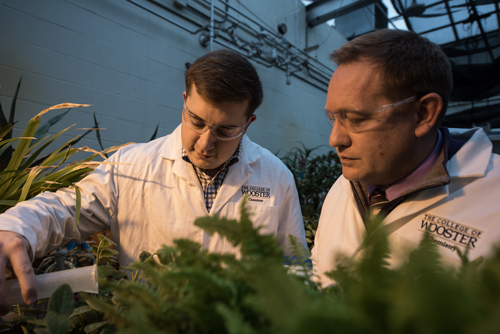
Senior Chemistry Major Contributes to R&D of Innovative New Product

WOOSTER, Ohio — Backyard gardeners will have a welcome ally as they prepare to till the soil this spring, thanks to a new product refined by researchers at The College of Wooster and produced by ABS Materials in Wooster.
Plant Booster, a derivative of the water-purifying product Osorb® media, is a bio-friendly combination of silica and iron, which absorbs destructive pesticides, cleanses the soil, and, as the name implies, provides a significant boost to the growth of the plants it treats.
The product evolved from earlier research at an on-campus bioswale where the effectiveness of Osorb media in capturing oil and gasoline runoff from nearby streets and parking lots was being measured. “We noticed that the plants in the bioswale were growing better in the area treated with the combination of Osorb media and iron,” says Paul Edmiston, professor of chemistry at Wooster and founder and chief science officer of ABS Materials. “We suspected the addition of the media was protecting plants — a side benefit of water being purified.”
The research at the bioswale was funded by the National Science Foundation with a Small Business Innovate Research grant, which, according to Edmiston, converts academic science into commercial applications through research. “The goal at the end of the project is to conduct experiments to validate innovative technology,” he says.
Enter Taylor Bowen, a chemistry major from Rydal, Ga., who was looking to restart his junior Independent Study project (Wooster’s nationally acclaimed undergraduate research experience) following the tragic death of his adviser, Melissa Schultz, associate professor of chemistry, in an automobile accident just north of campus last February.
“It was very sad,” remembers Edmiston, noting that everyone on campus, particularly faculty, students, and staff in the department of chemistry, was devastated by Schultz’s death. “I asked Taylor what he wanted to do for his thesis, and he said something in agriculture. I told him what we were working on with the bioswales, and his eyes lit up.” The two quickly realized that this collaboration would benefit both parties and help them move beyond the tragedy.
Bowen spent the remainder of that semester working to understand the project and developing experiments. Then he headed back to the family farm in Cartersville, about 45 minutes northwest of Atlanta, to measure its effectiveness on the growth of soybeans. He chose to study the product’s impact on the soybean for several reasons; (1) it is a valuable cash crop, (2) its prime growing season occurs in June and July, and (3) he had experience with the crop through a summer research internship at the University of Georgia’s Center for Applied Genetic Technologies following his sophomore year.
Bowen proceeded to set up four groups of soybean seedlings, each consisting of 10 plants. One set was treated with Plant Booster and atrazine, a common pesticide; another was treated with Plant Booster and no atrazine; a third group had atrazine but no plant booster; and a fourth set had no atrazine and no plant booster. Those treated with Plant Booster had 1¾ inches of the product placed in the filtration layer of the soil — about two percent of the total soil volume.
For the next six weeks, Bowen monitored the growth and changes of each plant while watering them in the morning and again at night. By August, he was ready to measure the height of each plant and begin to make some observations. Using a chlorophyll spectrometer to gauge the plant’s chlorophyll production (an indicator of the plant’s health), Bowen noted that the samples with Plant Booster yielded a higher bean production than the control group — 1.916 grams versus .956 grams (more than twice the mass) — substantial enough to be deemed statistically significant. From a financial perspective, he was able to show that Plant Booster could produce a crop value of $879.76 per acre while plants not treated with the product were projected to produce $439 of revenue per acre.
“Taylor’s findings reaffirmed what we thought,” says Edmiston. “The product not only reduced the amount of atrazine in the plant tissue, it also captured the pesticide and enabled us to remove it from the soil. It’s a true purifying agent.”
Edmiston added that Plant Booster apparently removed other unwanted inhibitory factors. “Plants and microbes release chemicals to stake a space to grow ,” he says. “Plant Booster can remove natural plant inhibitors from the soil.
“This is a great example of how Independent Study connects a student’s area of interest to an even more exciting opportunity,” adds Edmiston. “When you get a real result with a real product in a relatively short amount of time, it’s very rewarding. That’s something that just doesn’t happen at other colleges in the formal way that it does for students at Wooster who engage in projects that are so hands on.”
Bowen, meanwhile, was thrilled with the experience. “It’s a big deal for me to sit here and say that I completed I.S.,” he says, “but it’s an even bigger deal to be part of something like this, helping a company produce a product that has such great potential.”
Buoyed by the experience, Bowen is making plans to attend graduate school for agricultural science or agronomy. Beyond that, he says, “I could see myself working for a agrochemical company, looking for ways to better increase the yield of crops.”
Wherever his journey leads him, Bowen will no doubt find a sense of satisfaction whenever he passes a garden treated with Plant Booster, knowing that he had a role in helping that individual produce a more plentiful harvest.
Image: Senior chemistry major Taylor Bowen (left) and Professor of Chemistry Paul Edmiston have developed a new product that cleanses the soil and dramatically improves the yield for backyard gardeners.
Posted in News on March 4, 2016.
Related Posts
Related Areas of Study
Entrepreneurship
Identify opportunities and solutions that have value, then communicate that value to others
PathwayChemistry
Access to labs, research opportunities, and small classes give chemistry majors lots of options after graduation.
Major Minor

